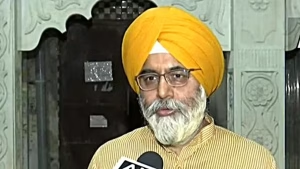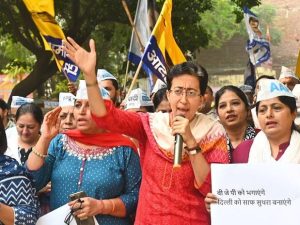New Delhi – A dramatic political confrontation unfolded in New Delhi as AAP Councillors Protest in Delhi took an unprecedented turn with the dumping of garbage outside the Mayor’s office at the Civic Centre. This bold demonstration by Aam Aadmi Party councillors on Thursday highlighted the escalating sanitation crisis in the Central zone while sparking intense political debate about municipal governance and accountability.
Unprecedented Demonstration at Civic Centre

The AAP Councillors Protest in Delhi involved a coordinated effort by party representatives who arrived at the Civic Centre seeking answers about the deteriorating sanitation conditions in the Central zone. The demonstration escalated when councillors discovered that Mayor Raja Iqbal Singh was not present in his office to address their concerns about the mounting garbage crisis.
This AAP Councillors Protest in Delhi represents a significant escalation in the ongoing political tensions between the ruling BJP in the Municipal Corporation of Delhi and the opposition AAP. The visual impact of garbage being dumped at the seat of municipal power sent a clear message about the party’s frustration with the current administration’s handling of basic civic services.
Leader of Opposition’s Justification


Ankush Narang, the Leader of Opposition in the MCD House, provided detailed justification for the AAP Councillors Protest in Delhi action. He explained that the AAP delegation had initially approached the Mayor’s office through proper channels, seeking answers and solutions to the sanitation crisis affecting residents of the Central zone.
The AAP Councillors Protest in Delhi escalated only after finding the Mayor absent from his office, leaving councillors with no avenue for direct dialogue. Narang emphasized that the demonstration, including chanting slogans and dumping trash at the entrance, became necessary when conventional political channels proved ineffective in addressing urgent public concerns.
Central Zone Sanitation Crisis
The AAP Councillors Protest in Delhi drew attention to the severe sanitation problems plaguing the Central zone, where residents have been struggling with mounds of accumulated garbage. Narang described the situation as the Central zone being “buried under mounds of garbage,” highlighting the scale of the crisis that prompted such dramatic protest action.
Also Read: National Herald Case: ED Claims Gandhis Acquired Rs. 2,000 Crore Assets for Rs. 50 Lakh
The AAP Councillors Protest in Delhi served as a visual representation of the conditions faced by residents, with councillors arguing that the BJP administration remains “preoccupied with power politics and is absent from ground realities.” This characterization frames the protest as a necessary intervention to force attention on neglected civic issues.
Mayor’s Strong Condemnation

Mayor Raja Iqbal Singh issued a sharp rebuke of the AAP Councillors Protest in Delhi, characterizing the garbage dumping as reflecting “the anarchic mentality of the party.” His response positioned the protest as inappropriate and counterproductive, arguing that it demonstrated AAP’s failure in both the Delhi government and the Municipal Corporation of Delhi.
The Mayor’s criticism of the AAP Councillors Protest in Delhi extended beyond the immediate action to broader questions about AAP’s governance capabilities. Singh’s comments suggested that the protest revealed fundamental flaws in AAP’s approach to municipal administration and political opposition.
Contract Expiry and Administrative Challenges
The root cause of the sanitation crisis that prompted the AAP Councillors Protest in Delhi lies in the expiry of the contract period with the private concessionaire responsible for waste management in the Central zone. This administrative gap has created a service vacuum that has directly impacted residents’ quality of life.
The AAP Councillors Protest in Delhi highlighted how the inability to appoint a new contractor has exacerbated the garbage crisis. The delay in contractor appointment has been attributed to the non-formation of the standing committee in MCD, creating a procedural bottleneck that has prevented resolution of the sanitation issues.
Standing Committee Formation Dispute
A significant political dimension of the AAP Councillors Protest in Delhi involves the contentious issue of MCD’s standing committee formation. Mayor Singh accused AAP of preventing the formation of the standing committee for two-and-a-half years, claiming this obstruction brought all development work to a standstill.
The AAP Councillors Protest in Delhi occurs against this backdrop of procedural disputes, with the Mayor arguing that the BJP administration quickly formed the standing committee upon coming to power. This timeline dispute adds another layer of political complexity to the sanitation crisis and the protest response.
Political Accountability and Responsibility


The AAP Councillors Protest in Delhi raises fundamental questions about political accountability in municipal governance. The protest action represents AAP’s attempt to hold the current administration accountable for service delivery failures while simultaneously facing criticism for their own role in administrative delays.
The AAP Councillors Protest in Delhi demonstrates how local political disputes can directly impact essential civic services. The intersection of political maneuvering and service delivery creates situations where residents suffer while political parties engage in blame-shifting rather than collaborative problem-solving.
Ward-Level Responsibility Focus
Mayor Singh’s response to the AAP Councillors Protest in Delhi included directing AAP councillors to focus on sanitation work in their respective wards. This redirection attempts to shift responsibility from the central administration to individual ward-level representatives, suggesting that effective garbage management requires local-level engagement.
The AAP Councillors Protest in Delhi thus becomes part of a broader debate about the appropriate level of responsibility for municipal services. The Mayor’s comments suggest that councillors should concentrate on ward-specific issues rather than engaging in city-wide political demonstrations.
Implications for Municipal Governance


The AAP Councillors Protest in Delhi highlights systemic challenges in municipal governance that extend beyond partisan politics. The protest reveals how administrative procedures, contract management, and political cooperation intersect to affect basic service delivery for Delhi residents.
The dramatic nature of the AAP Councillors Protest in Delhi underscores the frustration felt by opposition councillors who believe conventional political channels have failed to address urgent civic concerns. This protest method, while controversial, succeeded in drawing public attention to the sanitation crisis affecting the Central zone.
Future Political Dynamics
The AAP Councillors Protest in Delhi sets a precedent for opposition political action in municipal governance contexts. The willingness to engage in dramatic demonstration tactics suggests that traditional political dialogue may be insufficient for addressing complex civic challenges in highly polarized political environments.
This AAP Councillors Protest in Delhi will likely influence future interactions between the BJP administration and AAP opposition, potentially leading to either increased cooperation or further escalation of confrontational tactics. The effectiveness of such protest methods in achieving policy changes will determine whether similar demonstrations become more common in Delhi’s municipal politics.

